NCS3202 - Literature Review: Bullying and New Graduate Nurses
VerifiedAdded on 2023/06/07
|25
|5940
|343
Literature Review
AI Summary
This literature review delves into the pervasive issues of bullying and incivility within the nursing profession, particularly focusing on the experiences of new graduate nurses in Australia. It examines various forms of workplace mistreatment, including unreasonable blame, differential treatment, humiliation, and excessive monitoring. The review highlights the detrimental effects of such behaviors, such as increased anxiety, job burnout, and compromised patient care. It further explores strategies that new nurse graduates can employ to overcome these challenges and emphasizes the importance of interdisciplinary teamwork in fostering a supportive and respectful work environment. The review concludes by underscoring the need for healthcare organizations and educational institutions to implement and enforce policies that prevent and manage bullying and incivility, ensuring a safe and healthy work environment for all nursing professionals. Desklib provides access to this and many other solved assignments for students.
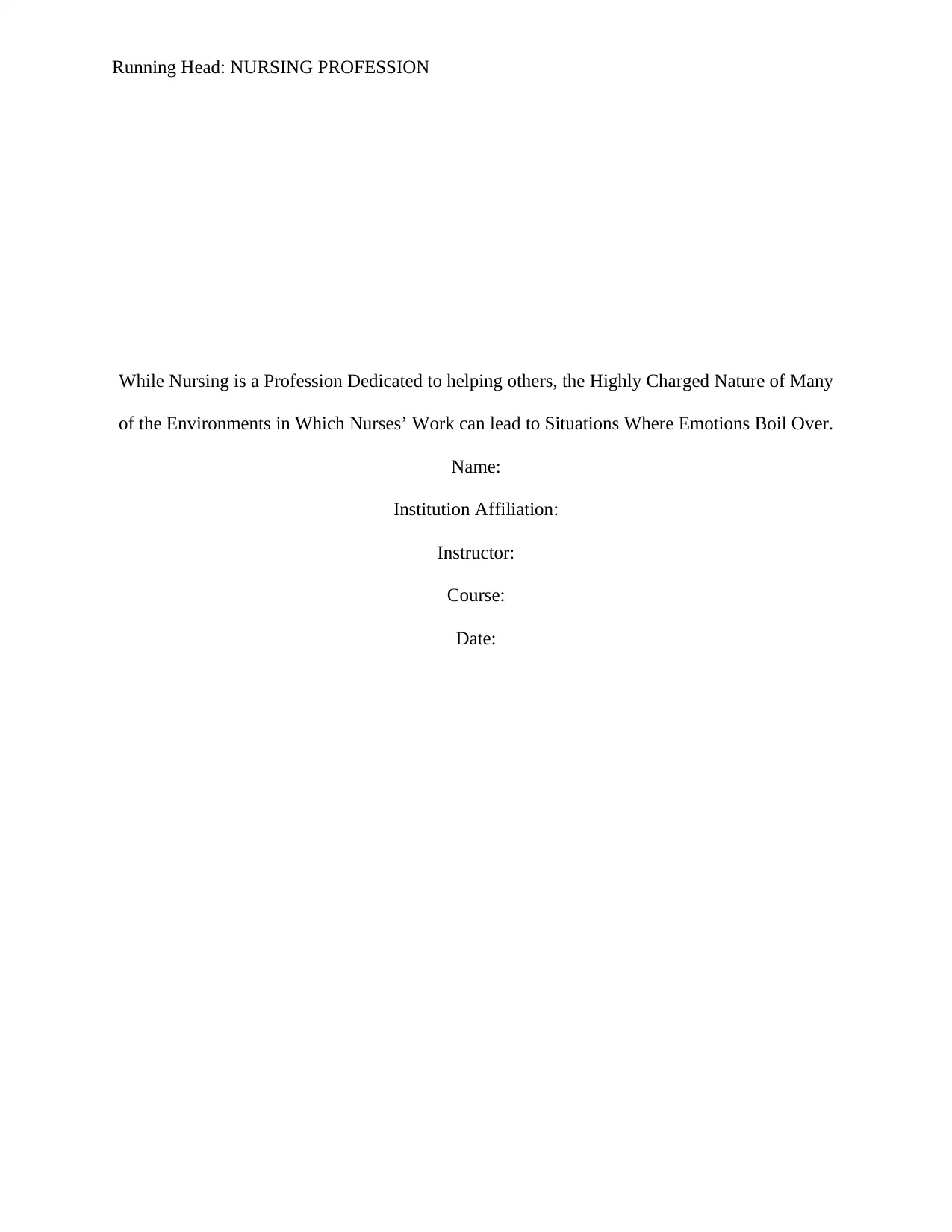
Running Head: NURSING PROFESSION
While Nursing is a Profession Dedicated to helping others, the Highly Charged Nature of Many
of the Environments in Which Nurses’ Work can lead to Situations Where Emotions Boil Over.
Name:
Institution Affiliation:
Instructor:
Course:
Date:
While Nursing is a Profession Dedicated to helping others, the Highly Charged Nature of Many
of the Environments in Which Nurses’ Work can lead to Situations Where Emotions Boil Over.
Name:
Institution Affiliation:
Instructor:
Course:
Date:
Paraphrase This Document
Need a fresh take? Get an instant paraphrase of this document with our AI Paraphraser
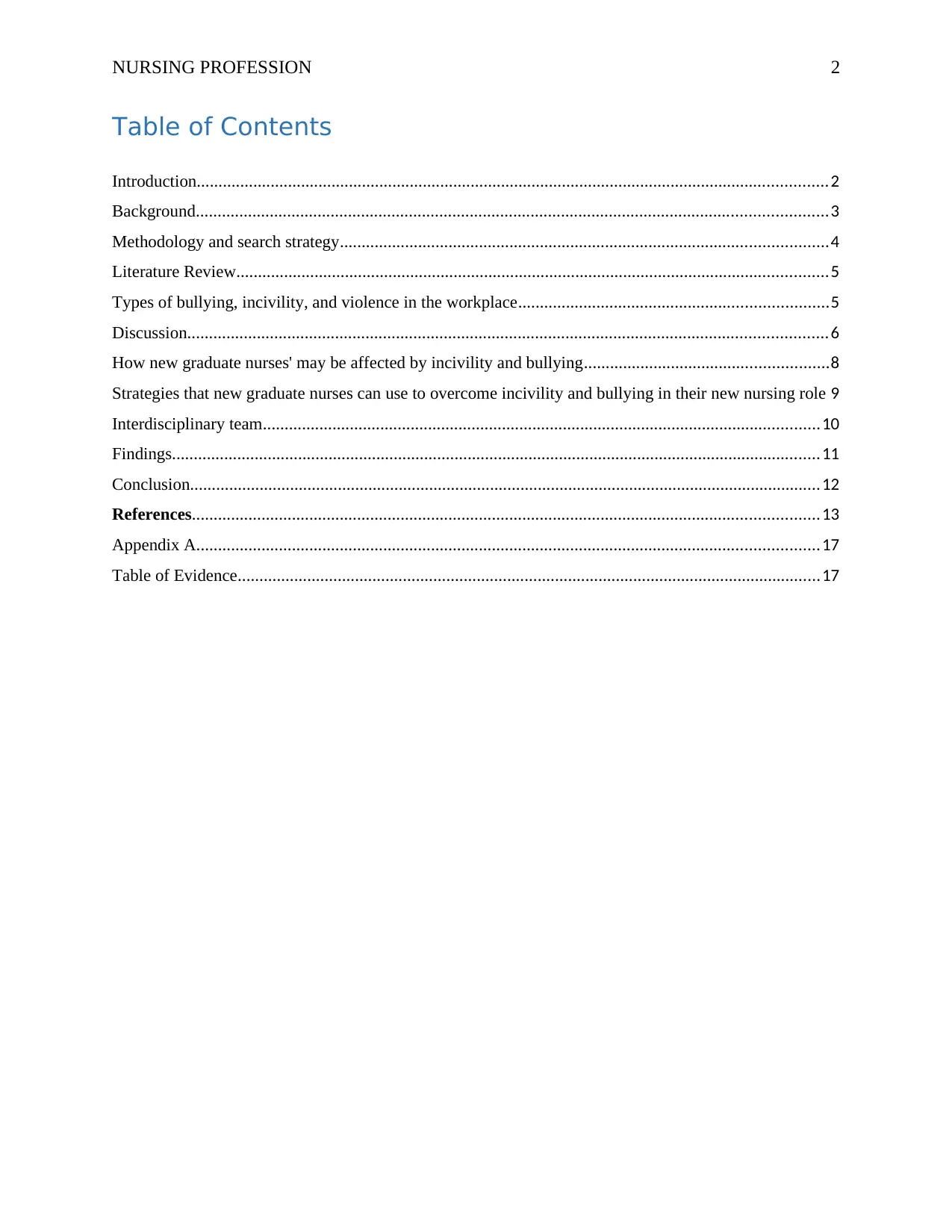
NURSING PROFESSION 2
Table of Contents
Introduction.................................................................................................................................................2
Background.................................................................................................................................................3
Methodology and search strategy................................................................................................................4
Literature Review........................................................................................................................................5
Types of bullying, incivility, and violence in the workplace.......................................................................5
Discussion...................................................................................................................................................6
How new graduate nurses' may be affected by incivility and bullying........................................................8
Strategies that new graduate nurses can use to overcome incivility and bullying in their new nursing role 9
Interdisciplinary team................................................................................................................................10
Findings.....................................................................................................................................................11
Conclusion.................................................................................................................................................12
References................................................................................................................................................13
Appendix A...............................................................................................................................................17
Table of Evidence......................................................................................................................................17
Table of Contents
Introduction.................................................................................................................................................2
Background.................................................................................................................................................3
Methodology and search strategy................................................................................................................4
Literature Review........................................................................................................................................5
Types of bullying, incivility, and violence in the workplace.......................................................................5
Discussion...................................................................................................................................................6
How new graduate nurses' may be affected by incivility and bullying........................................................8
Strategies that new graduate nurses can use to overcome incivility and bullying in their new nursing role 9
Interdisciplinary team................................................................................................................................10
Findings.....................................................................................................................................................11
Conclusion.................................................................................................................................................12
References................................................................................................................................................13
Appendix A...............................................................................................................................................17
Table of Evidence......................................................................................................................................17
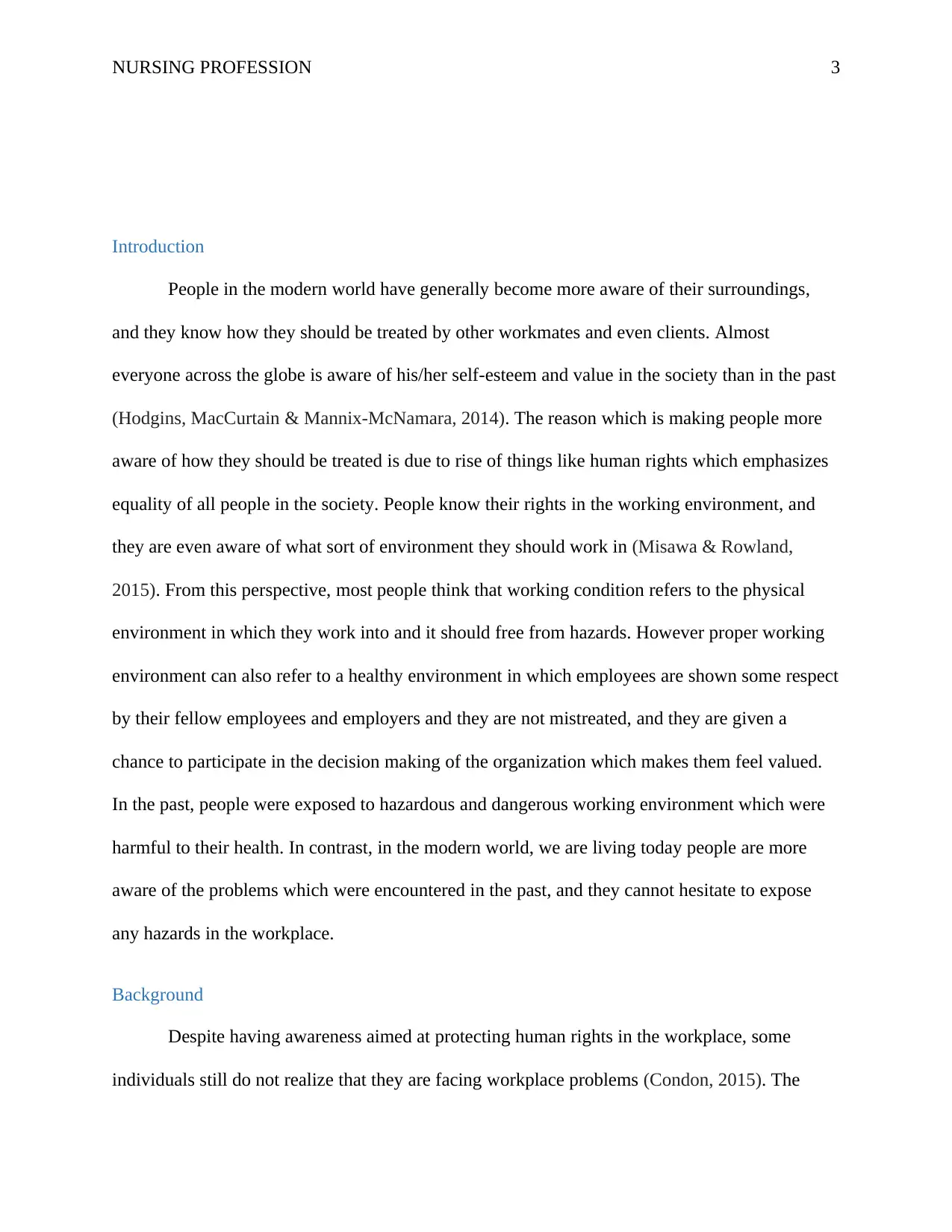
NURSING PROFESSION 3
Introduction
People in the modern world have generally become more aware of their surroundings,
and they know how they should be treated by other workmates and even clients. Almost
everyone across the globe is aware of his/her self-esteem and value in the society than in the past
(Hodgins, MacCurtain & Mannix-McNamara, 2014). The reason which is making people more
aware of how they should be treated is due to rise of things like human rights which emphasizes
equality of all people in the society. People know their rights in the working environment, and
they are even aware of what sort of environment they should work in (Misawa & Rowland,
2015). From this perspective, most people think that working condition refers to the physical
environment in which they work into and it should free from hazards. However proper working
environment can also refer to a healthy environment in which employees are shown some respect
by their fellow employees and employers and they are not mistreated, and they are given a
chance to participate in the decision making of the organization which makes them feel valued.
In the past, people were exposed to hazardous and dangerous working environment which were
harmful to their health. In contrast, in the modern world, we are living today people are more
aware of the problems which were encountered in the past, and they cannot hesitate to expose
any hazards in the workplace.
Background
Despite having awareness aimed at protecting human rights in the workplace, some
individuals still do not realize that they are facing workplace problems (Condon, 2015). The
Introduction
People in the modern world have generally become more aware of their surroundings,
and they know how they should be treated by other workmates and even clients. Almost
everyone across the globe is aware of his/her self-esteem and value in the society than in the past
(Hodgins, MacCurtain & Mannix-McNamara, 2014). The reason which is making people more
aware of how they should be treated is due to rise of things like human rights which emphasizes
equality of all people in the society. People know their rights in the working environment, and
they are even aware of what sort of environment they should work in (Misawa & Rowland,
2015). From this perspective, most people think that working condition refers to the physical
environment in which they work into and it should free from hazards. However proper working
environment can also refer to a healthy environment in which employees are shown some respect
by their fellow employees and employers and they are not mistreated, and they are given a
chance to participate in the decision making of the organization which makes them feel valued.
In the past, people were exposed to hazardous and dangerous working environment which were
harmful to their health. In contrast, in the modern world, we are living today people are more
aware of the problems which were encountered in the past, and they cannot hesitate to expose
any hazards in the workplace.
Background
Despite having awareness aimed at protecting human rights in the workplace, some
individuals still do not realize that they are facing workplace problems (Condon, 2015). The
⊘ This is a preview!⊘
Do you want full access?
Subscribe today to unlock all pages.

Trusted by 1+ million students worldwide
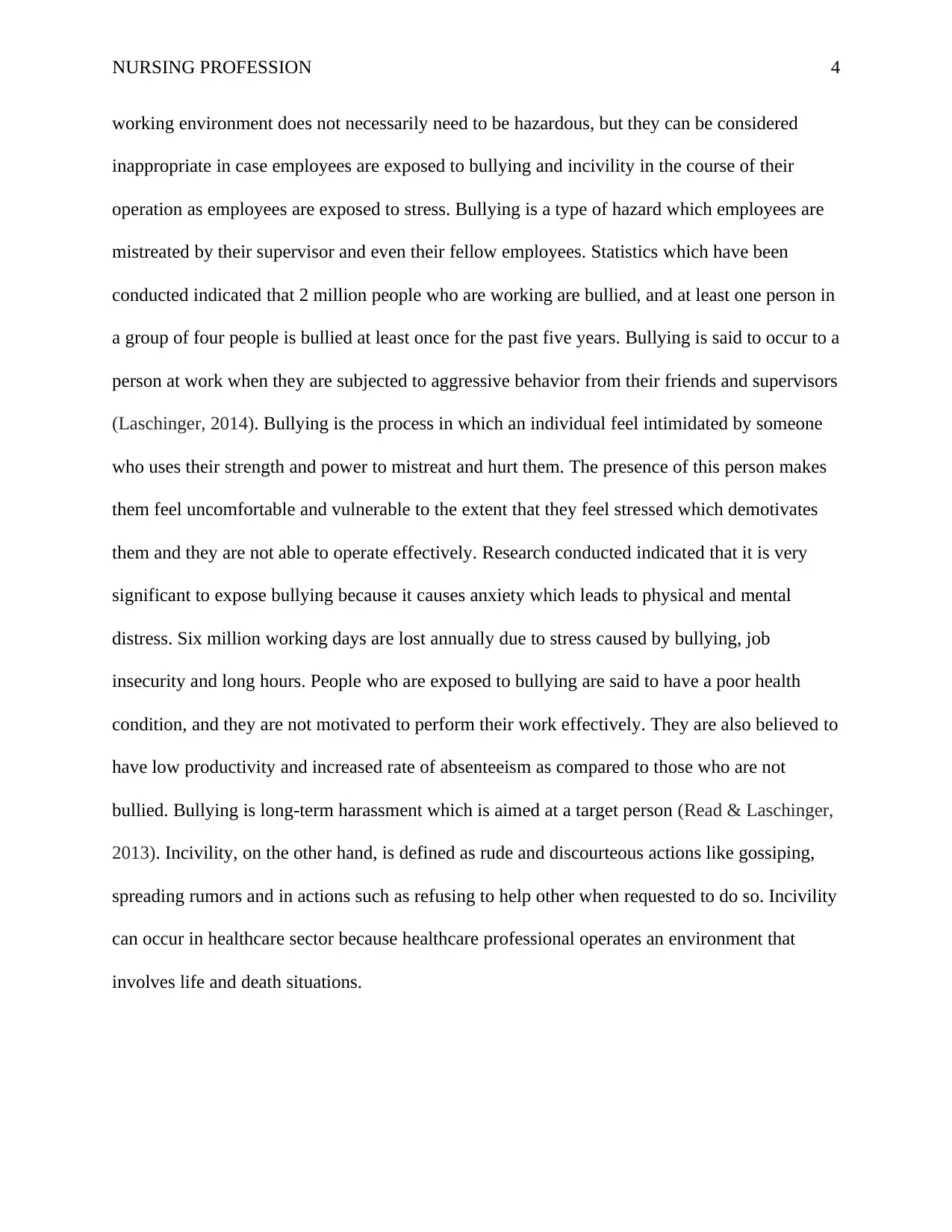
NURSING PROFESSION 4
working environment does not necessarily need to be hazardous, but they can be considered
inappropriate in case employees are exposed to bullying and incivility in the course of their
operation as employees are exposed to stress. Bullying is a type of hazard which employees are
mistreated by their supervisor and even their fellow employees. Statistics which have been
conducted indicated that 2 million people who are working are bullied, and at least one person in
a group of four people is bullied at least once for the past five years. Bullying is said to occur to a
person at work when they are subjected to aggressive behavior from their friends and supervisors
(Laschinger, 2014). Bullying is the process in which an individual feel intimidated by someone
who uses their strength and power to mistreat and hurt them. The presence of this person makes
them feel uncomfortable and vulnerable to the extent that they feel stressed which demotivates
them and they are not able to operate effectively. Research conducted indicated that it is very
significant to expose bullying because it causes anxiety which leads to physical and mental
distress. Six million working days are lost annually due to stress caused by bullying, job
insecurity and long hours. People who are exposed to bullying are said to have a poor health
condition, and they are not motivated to perform their work effectively. They are also believed to
have low productivity and increased rate of absenteeism as compared to those who are not
bullied. Bullying is long-term harassment which is aimed at a target person (Read & Laschinger,
2013). Incivility, on the other hand, is defined as rude and discourteous actions like gossiping,
spreading rumors and in actions such as refusing to help other when requested to do so. Incivility
can occur in healthcare sector because healthcare professional operates an environment that
involves life and death situations.
working environment does not necessarily need to be hazardous, but they can be considered
inappropriate in case employees are exposed to bullying and incivility in the course of their
operation as employees are exposed to stress. Bullying is a type of hazard which employees are
mistreated by their supervisor and even their fellow employees. Statistics which have been
conducted indicated that 2 million people who are working are bullied, and at least one person in
a group of four people is bullied at least once for the past five years. Bullying is said to occur to a
person at work when they are subjected to aggressive behavior from their friends and supervisors
(Laschinger, 2014). Bullying is the process in which an individual feel intimidated by someone
who uses their strength and power to mistreat and hurt them. The presence of this person makes
them feel uncomfortable and vulnerable to the extent that they feel stressed which demotivates
them and they are not able to operate effectively. Research conducted indicated that it is very
significant to expose bullying because it causes anxiety which leads to physical and mental
distress. Six million working days are lost annually due to stress caused by bullying, job
insecurity and long hours. People who are exposed to bullying are said to have a poor health
condition, and they are not motivated to perform their work effectively. They are also believed to
have low productivity and increased rate of absenteeism as compared to those who are not
bullied. Bullying is long-term harassment which is aimed at a target person (Read & Laschinger,
2013). Incivility, on the other hand, is defined as rude and discourteous actions like gossiping,
spreading rumors and in actions such as refusing to help other when requested to do so. Incivility
can occur in healthcare sector because healthcare professional operates an environment that
involves life and death situations.
Paraphrase This Document
Need a fresh take? Get an instant paraphrase of this document with our AI Paraphraser
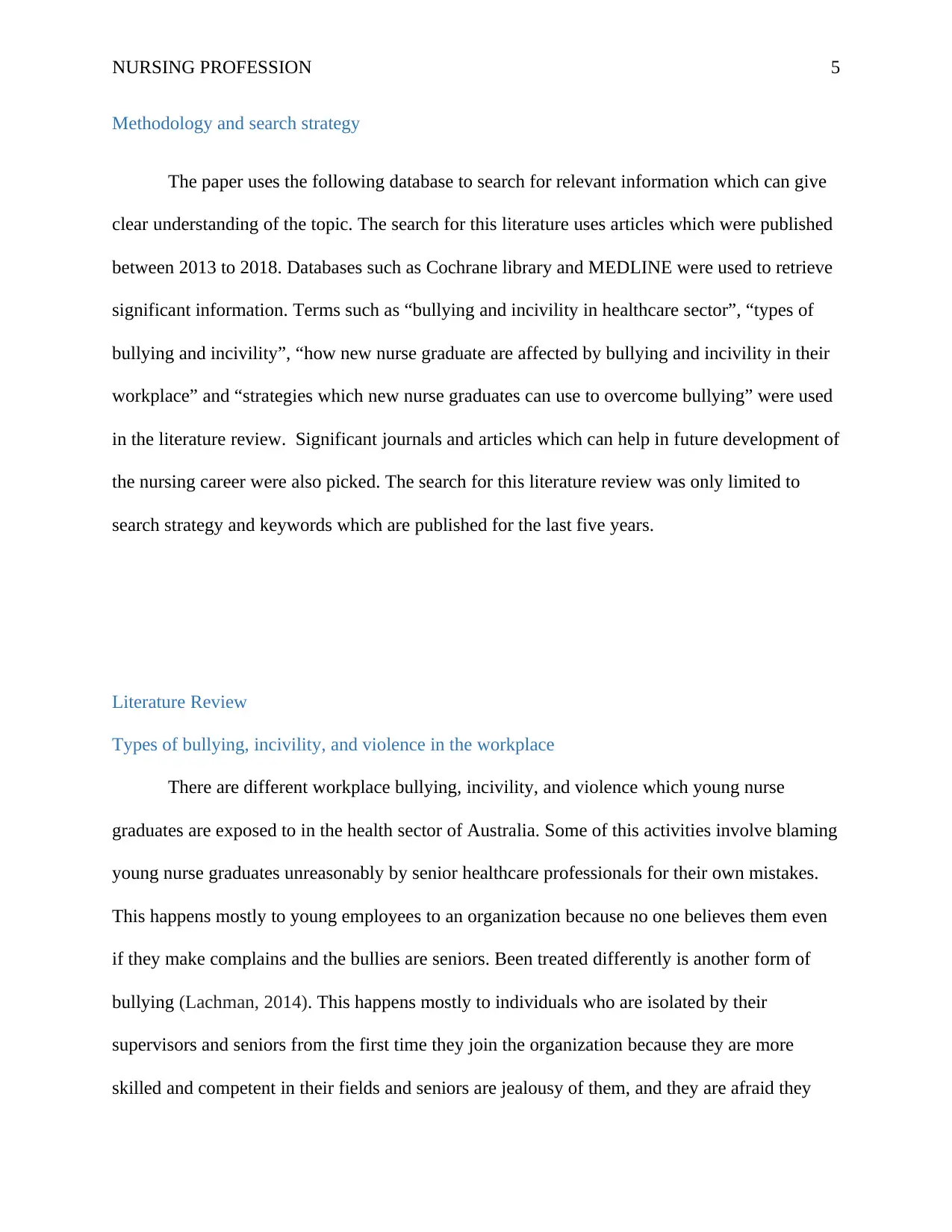
NURSING PROFESSION 5
Methodology and search strategy
The paper uses the following database to search for relevant information which can give
clear understanding of the topic. The search for this literature uses articles which were published
between 2013 to 2018. Databases such as Cochrane library and MEDLINE were used to retrieve
significant information. Terms such as “bullying and incivility in healthcare sector”, “types of
bullying and incivility”, “how new nurse graduate are affected by bullying and incivility in their
workplace” and “strategies which new nurse graduates can use to overcome bullying” were used
in the literature review. Significant journals and articles which can help in future development of
the nursing career were also picked. The search for this literature review was only limited to
search strategy and keywords which are published for the last five years.
Literature Review
Types of bullying, incivility, and violence in the workplace
There are different workplace bullying, incivility, and violence which young nurse
graduates are exposed to in the health sector of Australia. Some of this activities involve blaming
young nurse graduates unreasonably by senior healthcare professionals for their own mistakes.
This happens mostly to young employees to an organization because no one believes them even
if they make complains and the bullies are seniors. Been treated differently is another form of
bullying (Lachman, 2014). This happens mostly to individuals who are isolated by their
supervisors and seniors from the first time they join the organization because they are more
skilled and competent in their fields and seniors are jealousy of them, and they are afraid they
Methodology and search strategy
The paper uses the following database to search for relevant information which can give
clear understanding of the topic. The search for this literature uses articles which were published
between 2013 to 2018. Databases such as Cochrane library and MEDLINE were used to retrieve
significant information. Terms such as “bullying and incivility in healthcare sector”, “types of
bullying and incivility”, “how new nurse graduate are affected by bullying and incivility in their
workplace” and “strategies which new nurse graduates can use to overcome bullying” were used
in the literature review. Significant journals and articles which can help in future development of
the nursing career were also picked. The search for this literature review was only limited to
search strategy and keywords which are published for the last five years.
Literature Review
Types of bullying, incivility, and violence in the workplace
There are different workplace bullying, incivility, and violence which young nurse
graduates are exposed to in the health sector of Australia. Some of this activities involve blaming
young nurse graduates unreasonably by senior healthcare professionals for their own mistakes.
This happens mostly to young employees to an organization because no one believes them even
if they make complains and the bullies are seniors. Been treated differently is another form of
bullying (Lachman, 2014). This happens mostly to individuals who are isolated by their
supervisors and seniors from the first time they join the organization because they are more
skilled and competent in their fields and seniors are jealousy of them, and they are afraid they
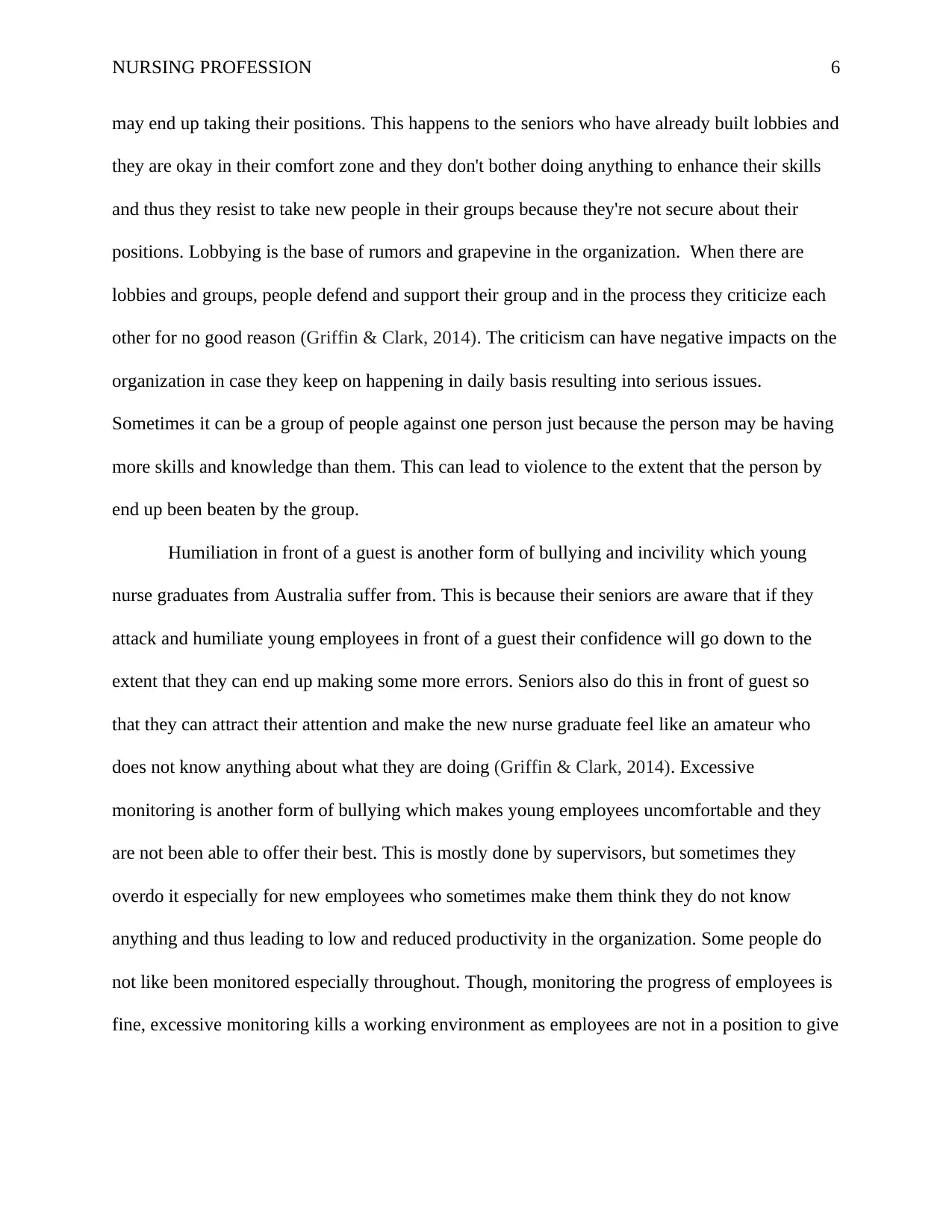
NURSING PROFESSION 6
may end up taking their positions. This happens to the seniors who have already built lobbies and
they are okay in their comfort zone and they don't bother doing anything to enhance their skills
and thus they resist to take new people in their groups because they're not secure about their
positions. Lobbying is the base of rumors and grapevine in the organization. When there are
lobbies and groups, people defend and support their group and in the process they criticize each
other for no good reason (Griffin & Clark, 2014). The criticism can have negative impacts on the
organization in case they keep on happening in daily basis resulting into serious issues.
Sometimes it can be a group of people against one person just because the person may be having
more skills and knowledge than them. This can lead to violence to the extent that the person by
end up been beaten by the group.
Humiliation in front of a guest is another form of bullying and incivility which young
nurse graduates from Australia suffer from. This is because their seniors are aware that if they
attack and humiliate young employees in front of a guest their confidence will go down to the
extent that they can end up making some more errors. Seniors also do this in front of guest so
that they can attract their attention and make the new nurse graduate feel like an amateur who
does not know anything about what they are doing (Griffin & Clark, 2014). Excessive
monitoring is another form of bullying which makes young employees uncomfortable and they
are not been able to offer their best. This is mostly done by supervisors, but sometimes they
overdo it especially for new employees who sometimes make them think they do not know
anything and thus leading to low and reduced productivity in the organization. Some people do
not like been monitored especially throughout. Though, monitoring the progress of employees is
fine, excessive monitoring kills a working environment as employees are not in a position to give
may end up taking their positions. This happens to the seniors who have already built lobbies and
they are okay in their comfort zone and they don't bother doing anything to enhance their skills
and thus they resist to take new people in their groups because they're not secure about their
positions. Lobbying is the base of rumors and grapevine in the organization. When there are
lobbies and groups, people defend and support their group and in the process they criticize each
other for no good reason (Griffin & Clark, 2014). The criticism can have negative impacts on the
organization in case they keep on happening in daily basis resulting into serious issues.
Sometimes it can be a group of people against one person just because the person may be having
more skills and knowledge than them. This can lead to violence to the extent that the person by
end up been beaten by the group.
Humiliation in front of a guest is another form of bullying and incivility which young
nurse graduates from Australia suffer from. This is because their seniors are aware that if they
attack and humiliate young employees in front of a guest their confidence will go down to the
extent that they can end up making some more errors. Seniors also do this in front of guest so
that they can attract their attention and make the new nurse graduate feel like an amateur who
does not know anything about what they are doing (Griffin & Clark, 2014). Excessive
monitoring is another form of bullying which makes young employees uncomfortable and they
are not been able to offer their best. This is mostly done by supervisors, but sometimes they
overdo it especially for new employees who sometimes make them think they do not know
anything and thus leading to low and reduced productivity in the organization. Some people do
not like been monitored especially throughout. Though, monitoring the progress of employees is
fine, excessive monitoring kills a working environment as employees are not in a position to give
⊘ This is a preview!⊘
Do you want full access?
Subscribe today to unlock all pages.

Trusted by 1+ million students worldwide
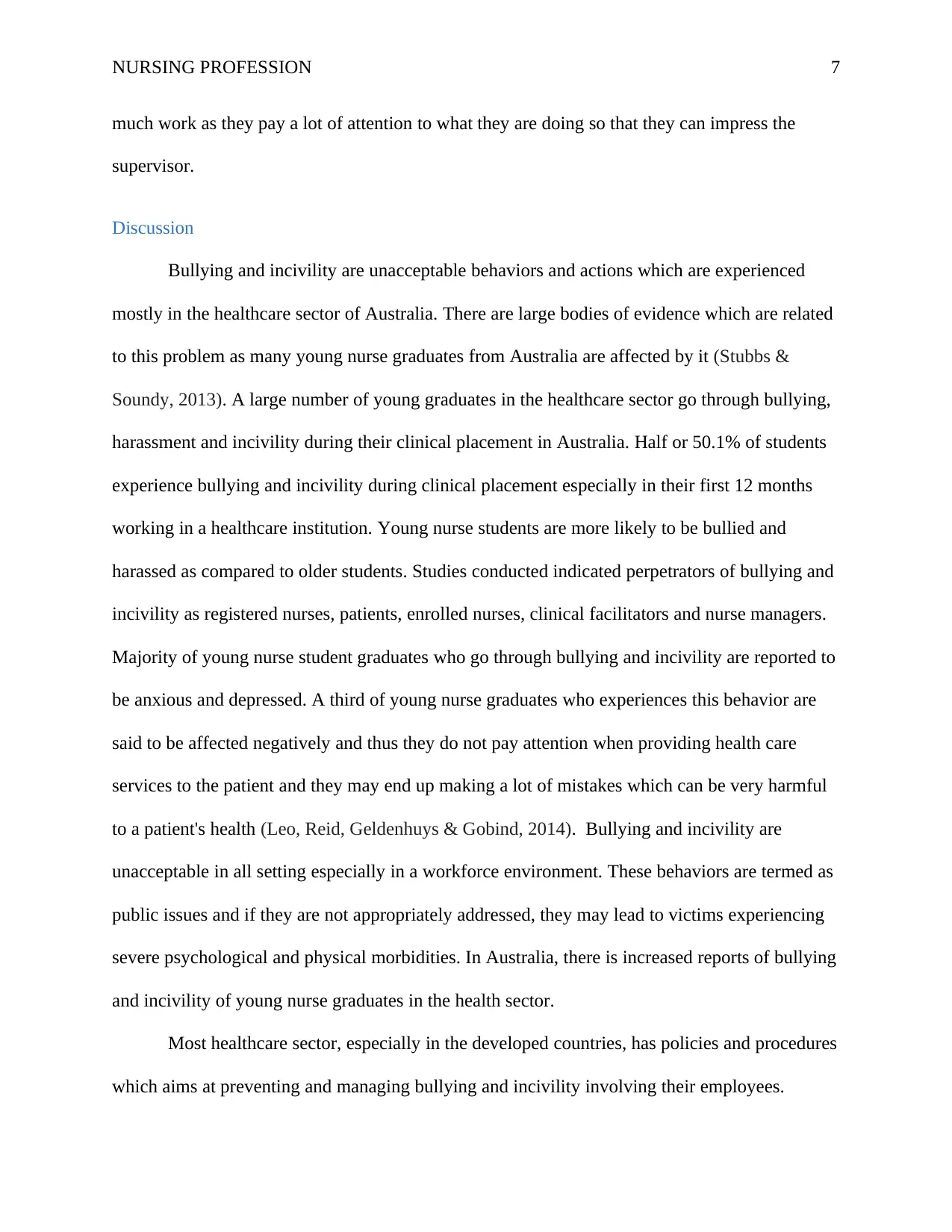
NURSING PROFESSION 7
much work as they pay a lot of attention to what they are doing so that they can impress the
supervisor.
Discussion
Bullying and incivility are unacceptable behaviors and actions which are experienced
mostly in the healthcare sector of Australia. There are large bodies of evidence which are related
to this problem as many young nurse graduates from Australia are affected by it (Stubbs &
Soundy, 2013). A large number of young graduates in the healthcare sector go through bullying,
harassment and incivility during their clinical placement in Australia. Half or 50.1% of students
experience bullying and incivility during clinical placement especially in their first 12 months
working in a healthcare institution. Young nurse students are more likely to be bullied and
harassed as compared to older students. Studies conducted indicated perpetrators of bullying and
incivility as registered nurses, patients, enrolled nurses, clinical facilitators and nurse managers.
Majority of young nurse student graduates who go through bullying and incivility are reported to
be anxious and depressed. A third of young nurse graduates who experiences this behavior are
said to be affected negatively and thus they do not pay attention when providing health care
services to the patient and they may end up making a lot of mistakes which can be very harmful
to a patient's health (Leo, Reid, Geldenhuys & Gobind, 2014). Bullying and incivility are
unacceptable in all setting especially in a workforce environment. These behaviors are termed as
public issues and if they are not appropriately addressed, they may lead to victims experiencing
severe psychological and physical morbidities. In Australia, there is increased reports of bullying
and incivility of young nurse graduates in the health sector.
Most healthcare sector, especially in the developed countries, has policies and procedures
which aims at preventing and managing bullying and incivility involving their employees.
much work as they pay a lot of attention to what they are doing so that they can impress the
supervisor.
Discussion
Bullying and incivility are unacceptable behaviors and actions which are experienced
mostly in the healthcare sector of Australia. There are large bodies of evidence which are related
to this problem as many young nurse graduates from Australia are affected by it (Stubbs &
Soundy, 2013). A large number of young graduates in the healthcare sector go through bullying,
harassment and incivility during their clinical placement in Australia. Half or 50.1% of students
experience bullying and incivility during clinical placement especially in their first 12 months
working in a healthcare institution. Young nurse students are more likely to be bullied and
harassed as compared to older students. Studies conducted indicated perpetrators of bullying and
incivility as registered nurses, patients, enrolled nurses, clinical facilitators and nurse managers.
Majority of young nurse student graduates who go through bullying and incivility are reported to
be anxious and depressed. A third of young nurse graduates who experiences this behavior are
said to be affected negatively and thus they do not pay attention when providing health care
services to the patient and they may end up making a lot of mistakes which can be very harmful
to a patient's health (Leo, Reid, Geldenhuys & Gobind, 2014). Bullying and incivility are
unacceptable in all setting especially in a workforce environment. These behaviors are termed as
public issues and if they are not appropriately addressed, they may lead to victims experiencing
severe psychological and physical morbidities. In Australia, there is increased reports of bullying
and incivility of young nurse graduates in the health sector.
Most healthcare sector, especially in the developed countries, has policies and procedures
which aims at preventing and managing bullying and incivility involving their employees.
Paraphrase This Document
Need a fresh take? Get an instant paraphrase of this document with our AI Paraphraser
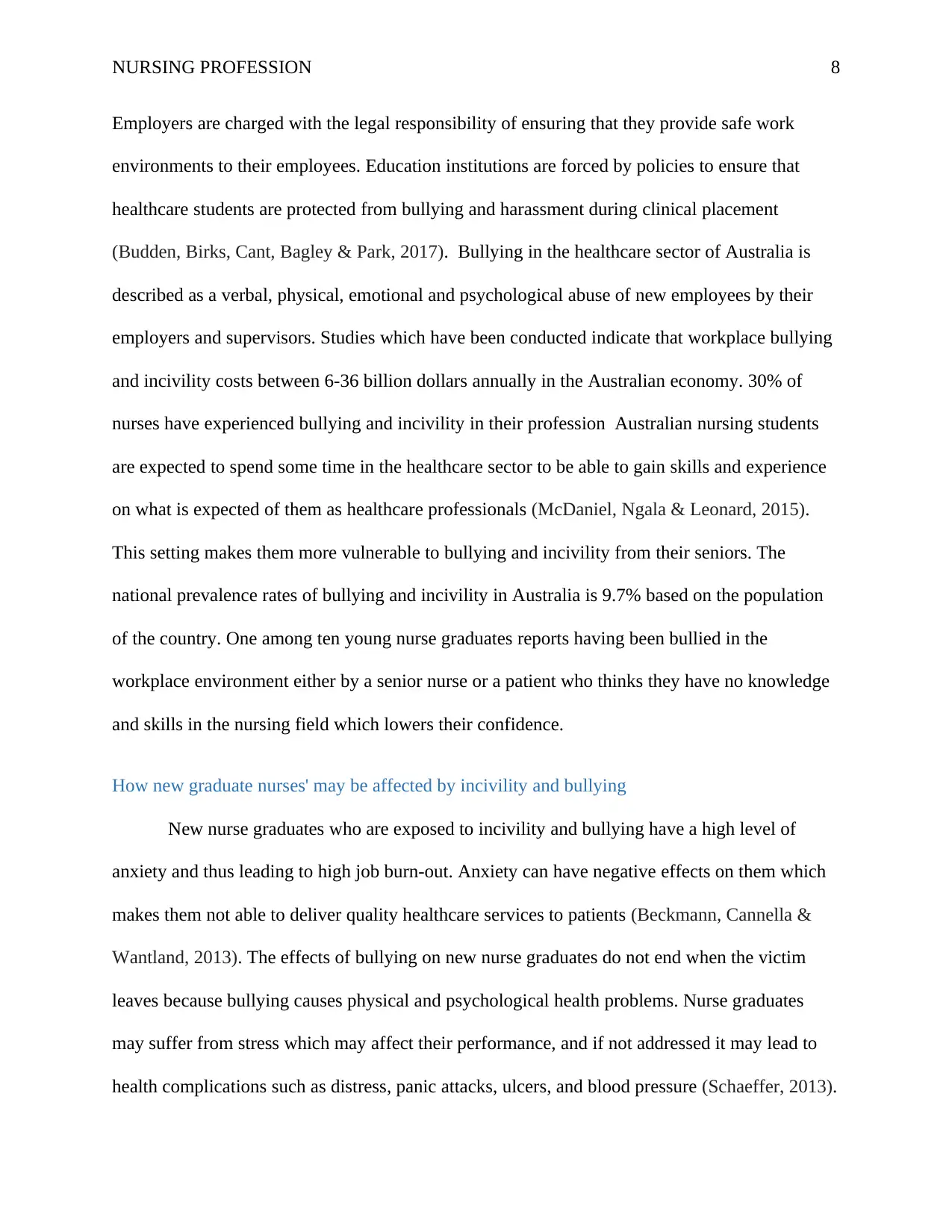
NURSING PROFESSION 8
Employers are charged with the legal responsibility of ensuring that they provide safe work
environments to their employees. Education institutions are forced by policies to ensure that
healthcare students are protected from bullying and harassment during clinical placement
(Budden, Birks, Cant, Bagley & Park, 2017). Bullying in the healthcare sector of Australia is
described as a verbal, physical, emotional and psychological abuse of new employees by their
employers and supervisors. Studies which have been conducted indicate that workplace bullying
and incivility costs between 6-36 billion dollars annually in the Australian economy. 30% of
nurses have experienced bullying and incivility in their profession Australian nursing students
are expected to spend some time in the healthcare sector to be able to gain skills and experience
on what is expected of them as healthcare professionals (McDaniel, Ngala & Leonard, 2015).
This setting makes them more vulnerable to bullying and incivility from their seniors. The
national prevalence rates of bullying and incivility in Australia is 9.7% based on the population
of the country. One among ten young nurse graduates reports having been bullied in the
workplace environment either by a senior nurse or a patient who thinks they have no knowledge
and skills in the nursing field which lowers their confidence.
How new graduate nurses' may be affected by incivility and bullying
New nurse graduates who are exposed to incivility and bullying have a high level of
anxiety and thus leading to high job burn-out. Anxiety can have negative effects on them which
makes them not able to deliver quality healthcare services to patients (Beckmann, Cannella &
Wantland, 2013). The effects of bullying on new nurse graduates do not end when the victim
leaves because bullying causes physical and psychological health problems. Nurse graduates
may suffer from stress which may affect their performance, and if not addressed it may lead to
health complications such as distress, panic attacks, ulcers, and blood pressure (Schaeffer, 2013).
Employers are charged with the legal responsibility of ensuring that they provide safe work
environments to their employees. Education institutions are forced by policies to ensure that
healthcare students are protected from bullying and harassment during clinical placement
(Budden, Birks, Cant, Bagley & Park, 2017). Bullying in the healthcare sector of Australia is
described as a verbal, physical, emotional and psychological abuse of new employees by their
employers and supervisors. Studies which have been conducted indicate that workplace bullying
and incivility costs between 6-36 billion dollars annually in the Australian economy. 30% of
nurses have experienced bullying and incivility in their profession Australian nursing students
are expected to spend some time in the healthcare sector to be able to gain skills and experience
on what is expected of them as healthcare professionals (McDaniel, Ngala & Leonard, 2015).
This setting makes them more vulnerable to bullying and incivility from their seniors. The
national prevalence rates of bullying and incivility in Australia is 9.7% based on the population
of the country. One among ten young nurse graduates reports having been bullied in the
workplace environment either by a senior nurse or a patient who thinks they have no knowledge
and skills in the nursing field which lowers their confidence.
How new graduate nurses' may be affected by incivility and bullying
New nurse graduates who are exposed to incivility and bullying have a high level of
anxiety and thus leading to high job burn-out. Anxiety can have negative effects on them which
makes them not able to deliver quality healthcare services to patients (Beckmann, Cannella &
Wantland, 2013). The effects of bullying on new nurse graduates do not end when the victim
leaves because bullying causes physical and psychological health problems. Nurse graduates
may suffer from stress which may affect their performance, and if not addressed it may lead to
health complications such as distress, panic attacks, ulcers, and blood pressure (Schaeffer, 2013).
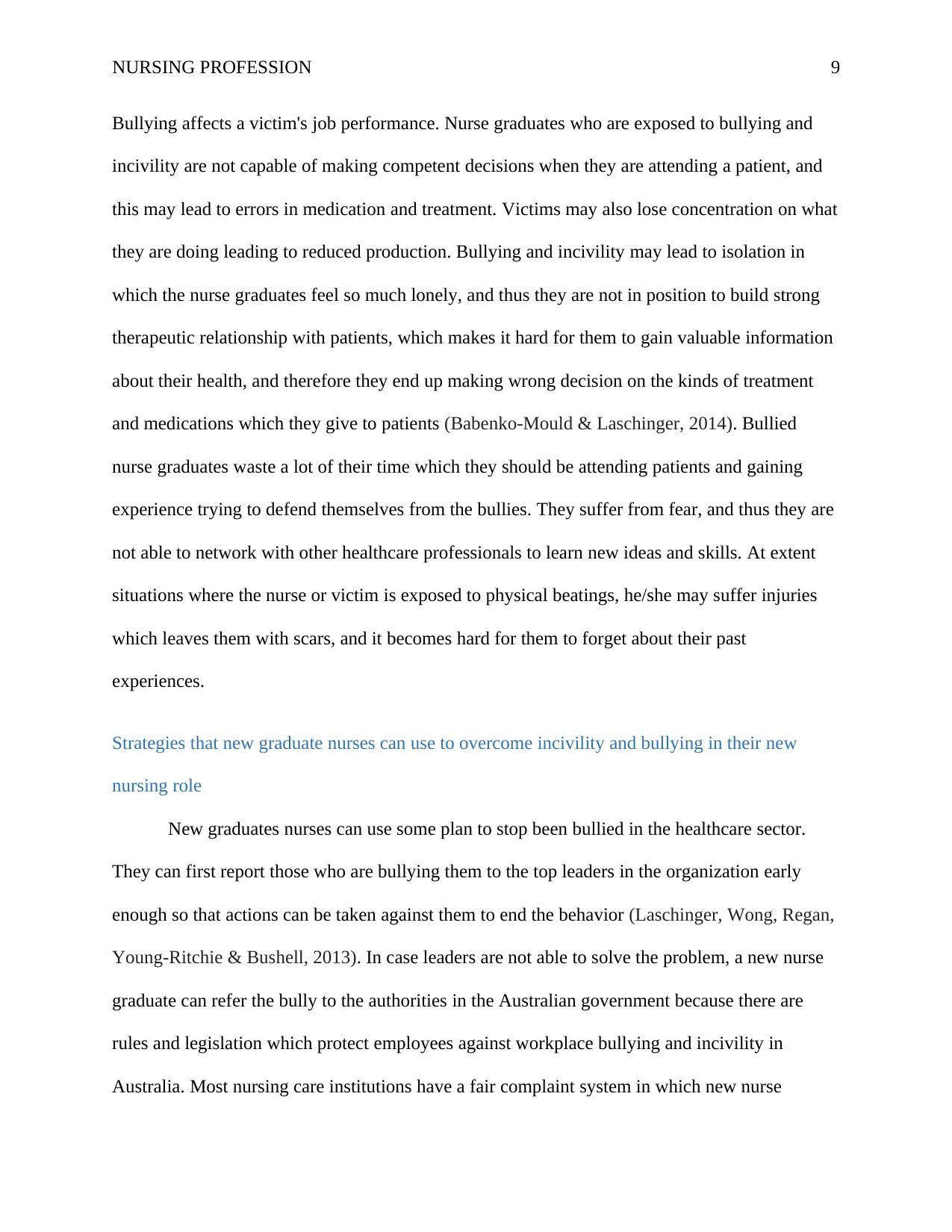
NURSING PROFESSION 9
Bullying affects a victim's job performance. Nurse graduates who are exposed to bullying and
incivility are not capable of making competent decisions when they are attending a patient, and
this may lead to errors in medication and treatment. Victims may also lose concentration on what
they are doing leading to reduced production. Bullying and incivility may lead to isolation in
which the nurse graduates feel so much lonely, and thus they are not in position to build strong
therapeutic relationship with patients, which makes it hard for them to gain valuable information
about their health, and therefore they end up making wrong decision on the kinds of treatment
and medications which they give to patients (Babenko-Mould & Laschinger, 2014). Bullied
nurse graduates waste a lot of their time which they should be attending patients and gaining
experience trying to defend themselves from the bullies. They suffer from fear, and thus they are
not able to network with other healthcare professionals to learn new ideas and skills. At extent
situations where the nurse or victim is exposed to physical beatings, he/she may suffer injuries
which leaves them with scars, and it becomes hard for them to forget about their past
experiences.
Strategies that new graduate nurses can use to overcome incivility and bullying in their new
nursing role
New graduates nurses can use some plan to stop been bullied in the healthcare sector.
They can first report those who are bullying them to the top leaders in the organization early
enough so that actions can be taken against them to end the behavior (Laschinger, Wong, Regan,
Young-Ritchie & Bushell, 2013). In case leaders are not able to solve the problem, a new nurse
graduate can refer the bully to the authorities in the Australian government because there are
rules and legislation which protect employees against workplace bullying and incivility in
Australia. Most nursing care institutions have a fair complaint system in which new nurse
Bullying affects a victim's job performance. Nurse graduates who are exposed to bullying and
incivility are not capable of making competent decisions when they are attending a patient, and
this may lead to errors in medication and treatment. Victims may also lose concentration on what
they are doing leading to reduced production. Bullying and incivility may lead to isolation in
which the nurse graduates feel so much lonely, and thus they are not in position to build strong
therapeutic relationship with patients, which makes it hard for them to gain valuable information
about their health, and therefore they end up making wrong decision on the kinds of treatment
and medications which they give to patients (Babenko-Mould & Laschinger, 2014). Bullied
nurse graduates waste a lot of their time which they should be attending patients and gaining
experience trying to defend themselves from the bullies. They suffer from fear, and thus they are
not able to network with other healthcare professionals to learn new ideas and skills. At extent
situations where the nurse or victim is exposed to physical beatings, he/she may suffer injuries
which leaves them with scars, and it becomes hard for them to forget about their past
experiences.
Strategies that new graduate nurses can use to overcome incivility and bullying in their new
nursing role
New graduates nurses can use some plan to stop been bullied in the healthcare sector.
They can first report those who are bullying them to the top leaders in the organization early
enough so that actions can be taken against them to end the behavior (Laschinger, Wong, Regan,
Young-Ritchie & Bushell, 2013). In case leaders are not able to solve the problem, a new nurse
graduate can refer the bully to the authorities in the Australian government because there are
rules and legislation which protect employees against workplace bullying and incivility in
Australia. Most nursing care institutions have a fair complaint system in which new nurse
⊘ This is a preview!⊘
Do you want full access?
Subscribe today to unlock all pages.

Trusted by 1+ million students worldwide
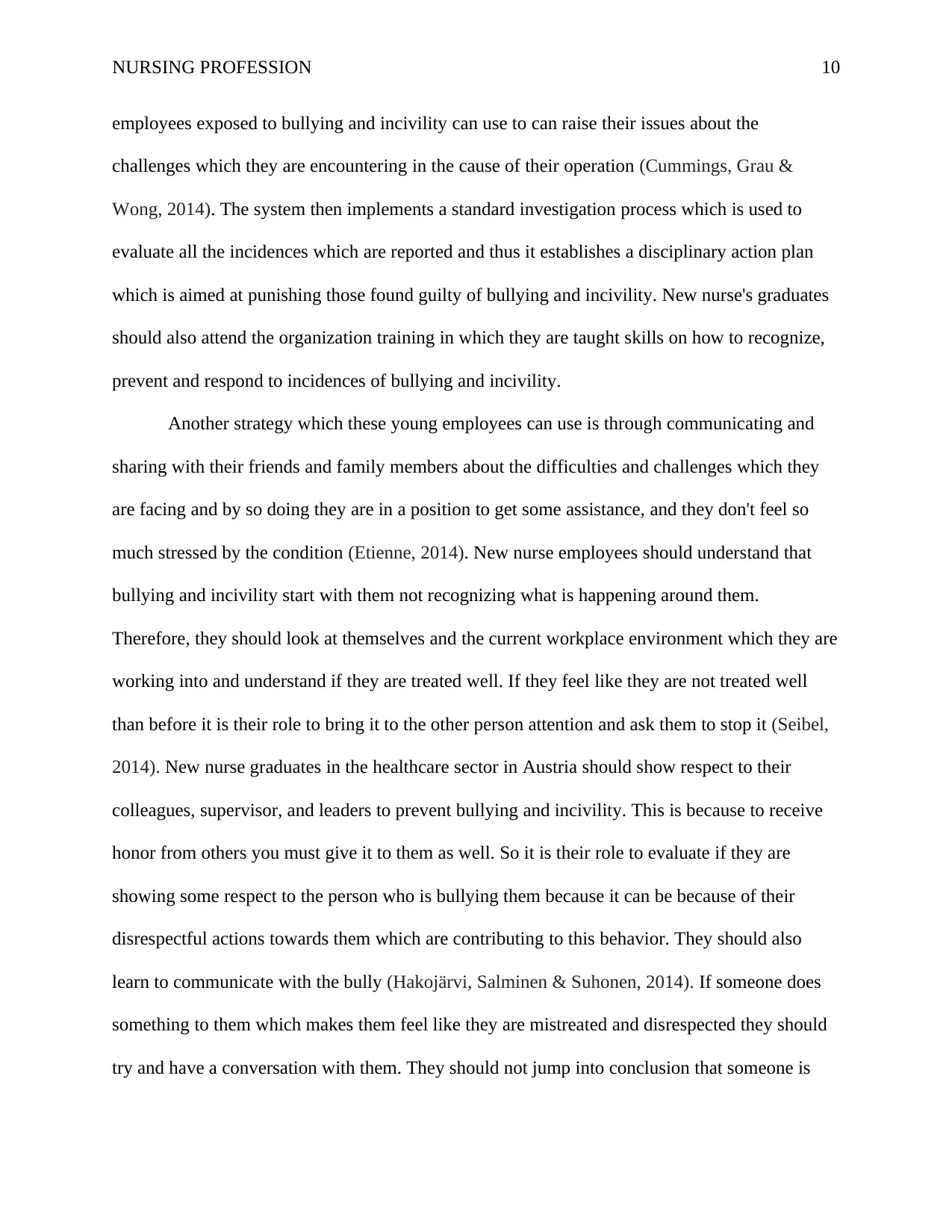
NURSING PROFESSION 10
employees exposed to bullying and incivility can use to can raise their issues about the
challenges which they are encountering in the cause of their operation (Cummings, Grau &
Wong, 2014). The system then implements a standard investigation process which is used to
evaluate all the incidences which are reported and thus it establishes a disciplinary action plan
which is aimed at punishing those found guilty of bullying and incivility. New nurse's graduates
should also attend the organization training in which they are taught skills on how to recognize,
prevent and respond to incidences of bullying and incivility.
Another strategy which these young employees can use is through communicating and
sharing with their friends and family members about the difficulties and challenges which they
are facing and by so doing they are in a position to get some assistance, and they don't feel so
much stressed by the condition (Etienne, 2014). New nurse employees should understand that
bullying and incivility start with them not recognizing what is happening around them.
Therefore, they should look at themselves and the current workplace environment which they are
working into and understand if they are treated well. If they feel like they are not treated well
than before it is their role to bring it to the other person attention and ask them to stop it (Seibel,
2014). New nurse graduates in the healthcare sector in Austria should show respect to their
colleagues, supervisor, and leaders to prevent bullying and incivility. This is because to receive
honor from others you must give it to them as well. So it is their role to evaluate if they are
showing some respect to the person who is bullying them because it can be because of their
disrespectful actions towards them which are contributing to this behavior. They should also
learn to communicate with the bully (Hakojärvi, Salminen & Suhonen, 2014). If someone does
something to them which makes them feel like they are mistreated and disrespected they should
try and have a conversation with them. They should not jump into conclusion that someone is
employees exposed to bullying and incivility can use to can raise their issues about the
challenges which they are encountering in the cause of their operation (Cummings, Grau &
Wong, 2014). The system then implements a standard investigation process which is used to
evaluate all the incidences which are reported and thus it establishes a disciplinary action plan
which is aimed at punishing those found guilty of bullying and incivility. New nurse's graduates
should also attend the organization training in which they are taught skills on how to recognize,
prevent and respond to incidences of bullying and incivility.
Another strategy which these young employees can use is through communicating and
sharing with their friends and family members about the difficulties and challenges which they
are facing and by so doing they are in a position to get some assistance, and they don't feel so
much stressed by the condition (Etienne, 2014). New nurse employees should understand that
bullying and incivility start with them not recognizing what is happening around them.
Therefore, they should look at themselves and the current workplace environment which they are
working into and understand if they are treated well. If they feel like they are not treated well
than before it is their role to bring it to the other person attention and ask them to stop it (Seibel,
2014). New nurse graduates in the healthcare sector in Austria should show respect to their
colleagues, supervisor, and leaders to prevent bullying and incivility. This is because to receive
honor from others you must give it to them as well. So it is their role to evaluate if they are
showing some respect to the person who is bullying them because it can be because of their
disrespectful actions towards them which are contributing to this behavior. They should also
learn to communicate with the bully (Hakojärvi, Salminen & Suhonen, 2014). If someone does
something to them which makes them feel like they are mistreated and disrespected they should
try and have a conversation with them. They should not jump into conclusion that someone is
Paraphrase This Document
Need a fresh take? Get an instant paraphrase of this document with our AI Paraphraser
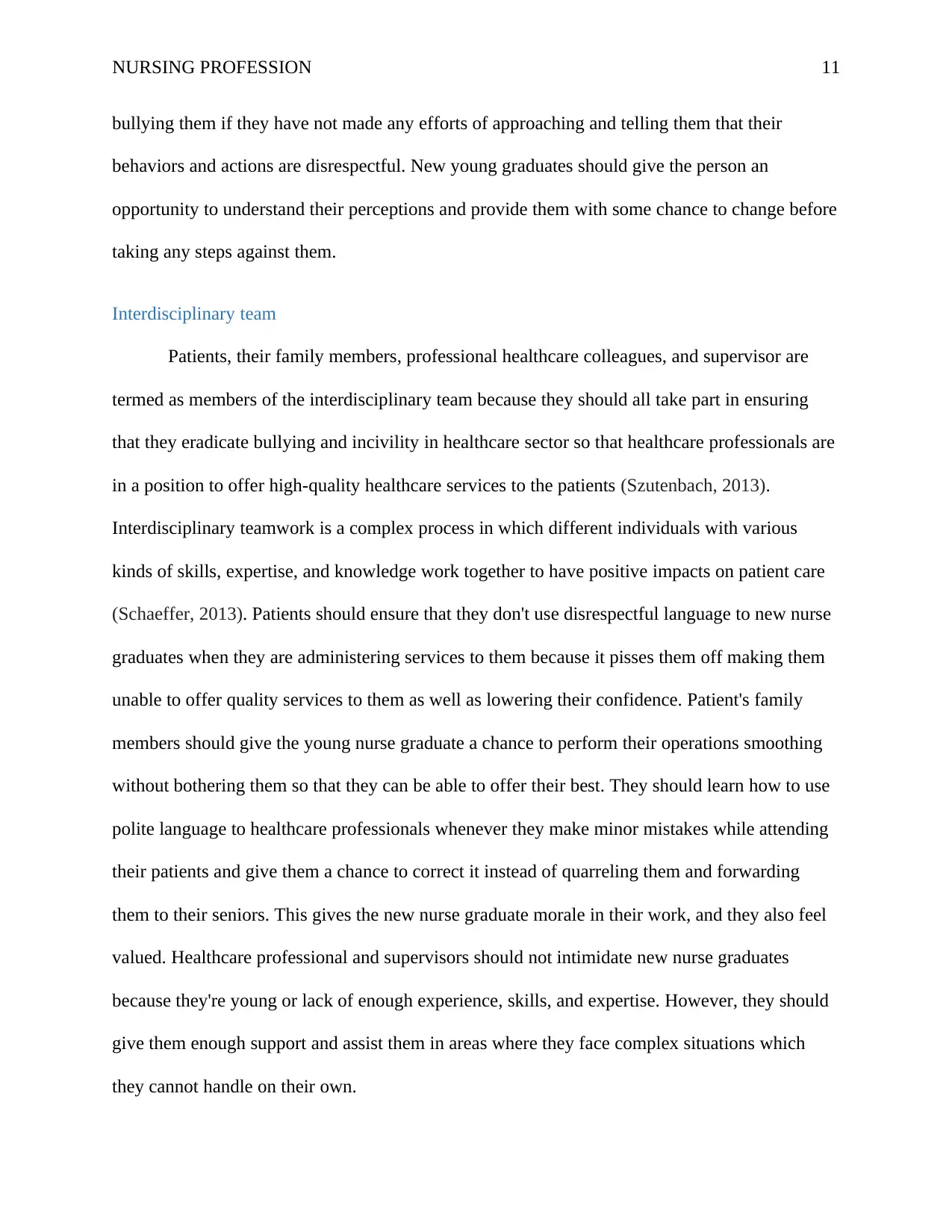
NURSING PROFESSION 11
bullying them if they have not made any efforts of approaching and telling them that their
behaviors and actions are disrespectful. New young graduates should give the person an
opportunity to understand their perceptions and provide them with some chance to change before
taking any steps against them.
Interdisciplinary team
Patients, their family members, professional healthcare colleagues, and supervisor are
termed as members of the interdisciplinary team because they should all take part in ensuring
that they eradicate bullying and incivility in healthcare sector so that healthcare professionals are
in a position to offer high-quality healthcare services to the patients (Szutenbach, 2013).
Interdisciplinary teamwork is a complex process in which different individuals with various
kinds of skills, expertise, and knowledge work together to have positive impacts on patient care
(Schaeffer, 2013). Patients should ensure that they don't use disrespectful language to new nurse
graduates when they are administering services to them because it pisses them off making them
unable to offer quality services to them as well as lowering their confidence. Patient's family
members should give the young nurse graduate a chance to perform their operations smoothing
without bothering them so that they can be able to offer their best. They should learn how to use
polite language to healthcare professionals whenever they make minor mistakes while attending
their patients and give them a chance to correct it instead of quarreling them and forwarding
them to their seniors. This gives the new nurse graduate morale in their work, and they also feel
valued. Healthcare professional and supervisors should not intimidate new nurse graduates
because they're young or lack of enough experience, skills, and expertise. However, they should
give them enough support and assist them in areas where they face complex situations which
they cannot handle on their own.
bullying them if they have not made any efforts of approaching and telling them that their
behaviors and actions are disrespectful. New young graduates should give the person an
opportunity to understand their perceptions and provide them with some chance to change before
taking any steps against them.
Interdisciplinary team
Patients, their family members, professional healthcare colleagues, and supervisor are
termed as members of the interdisciplinary team because they should all take part in ensuring
that they eradicate bullying and incivility in healthcare sector so that healthcare professionals are
in a position to offer high-quality healthcare services to the patients (Szutenbach, 2013).
Interdisciplinary teamwork is a complex process in which different individuals with various
kinds of skills, expertise, and knowledge work together to have positive impacts on patient care
(Schaeffer, 2013). Patients should ensure that they don't use disrespectful language to new nurse
graduates when they are administering services to them because it pisses them off making them
unable to offer quality services to them as well as lowering their confidence. Patient's family
members should give the young nurse graduate a chance to perform their operations smoothing
without bothering them so that they can be able to offer their best. They should learn how to use
polite language to healthcare professionals whenever they make minor mistakes while attending
their patients and give them a chance to correct it instead of quarreling them and forwarding
them to their seniors. This gives the new nurse graduate morale in their work, and they also feel
valued. Healthcare professional and supervisors should not intimidate new nurse graduates
because they're young or lack of enough experience, skills, and expertise. However, they should
give them enough support and assist them in areas where they face complex situations which
they cannot handle on their own.
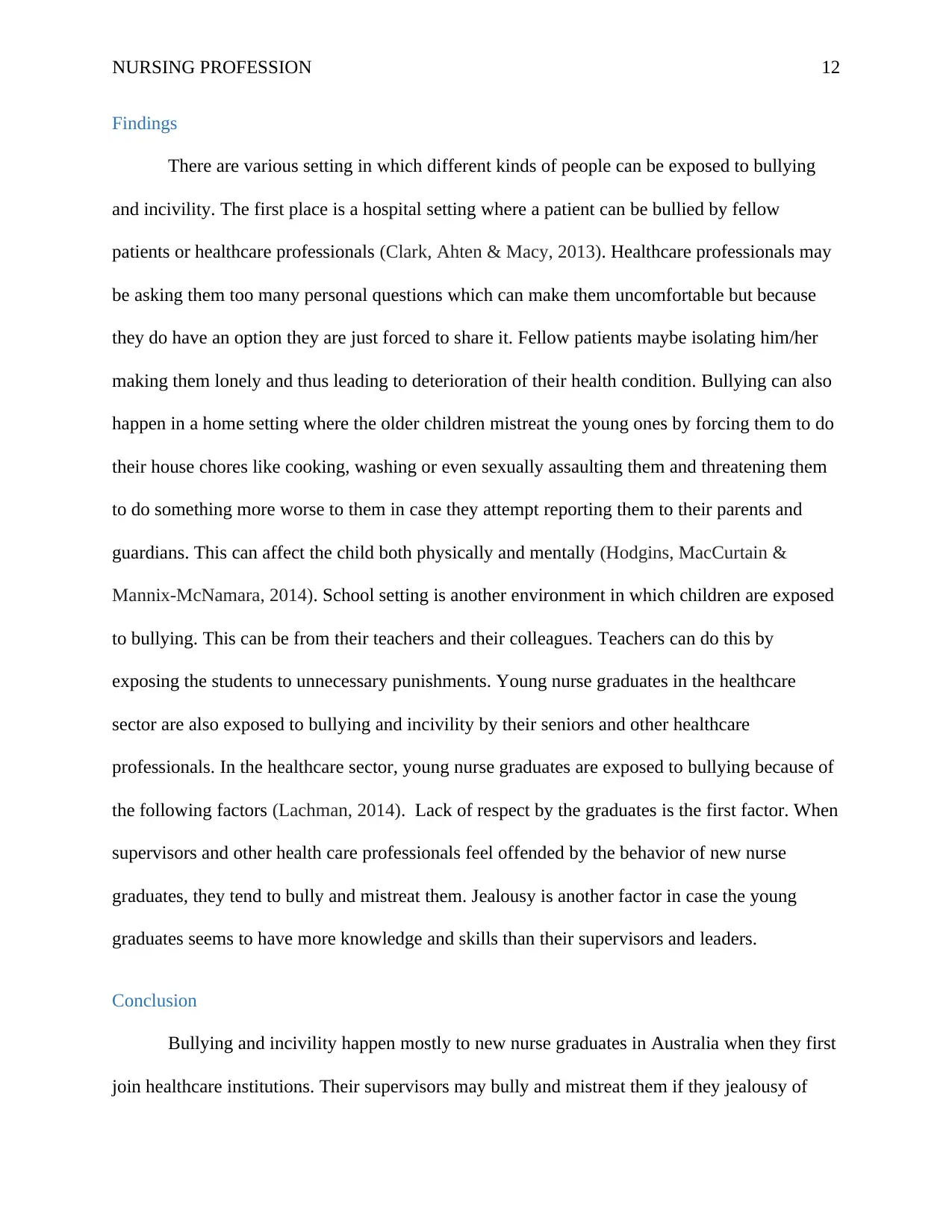
NURSING PROFESSION 12
Findings
There are various setting in which different kinds of people can be exposed to bullying
and incivility. The first place is a hospital setting where a patient can be bullied by fellow
patients or healthcare professionals (Clark, Ahten & Macy, 2013). Healthcare professionals may
be asking them too many personal questions which can make them uncomfortable but because
they do have an option they are just forced to share it. Fellow patients maybe isolating him/her
making them lonely and thus leading to deterioration of their health condition. Bullying can also
happen in a home setting where the older children mistreat the young ones by forcing them to do
their house chores like cooking, washing or even sexually assaulting them and threatening them
to do something more worse to them in case they attempt reporting them to their parents and
guardians. This can affect the child both physically and mentally (Hodgins, MacCurtain &
Mannix-McNamara, 2014). School setting is another environment in which children are exposed
to bullying. This can be from their teachers and their colleagues. Teachers can do this by
exposing the students to unnecessary punishments. Young nurse graduates in the healthcare
sector are also exposed to bullying and incivility by their seniors and other healthcare
professionals. In the healthcare sector, young nurse graduates are exposed to bullying because of
the following factors (Lachman, 2014). Lack of respect by the graduates is the first factor. When
supervisors and other health care professionals feel offended by the behavior of new nurse
graduates, they tend to bully and mistreat them. Jealousy is another factor in case the young
graduates seems to have more knowledge and skills than their supervisors and leaders.
Conclusion
Bullying and incivility happen mostly to new nurse graduates in Australia when they first
join healthcare institutions. Their supervisors may bully and mistreat them if they jealousy of
Findings
There are various setting in which different kinds of people can be exposed to bullying
and incivility. The first place is a hospital setting where a patient can be bullied by fellow
patients or healthcare professionals (Clark, Ahten & Macy, 2013). Healthcare professionals may
be asking them too many personal questions which can make them uncomfortable but because
they do have an option they are just forced to share it. Fellow patients maybe isolating him/her
making them lonely and thus leading to deterioration of their health condition. Bullying can also
happen in a home setting where the older children mistreat the young ones by forcing them to do
their house chores like cooking, washing or even sexually assaulting them and threatening them
to do something more worse to them in case they attempt reporting them to their parents and
guardians. This can affect the child both physically and mentally (Hodgins, MacCurtain &
Mannix-McNamara, 2014). School setting is another environment in which children are exposed
to bullying. This can be from their teachers and their colleagues. Teachers can do this by
exposing the students to unnecessary punishments. Young nurse graduates in the healthcare
sector are also exposed to bullying and incivility by their seniors and other healthcare
professionals. In the healthcare sector, young nurse graduates are exposed to bullying because of
the following factors (Lachman, 2014). Lack of respect by the graduates is the first factor. When
supervisors and other health care professionals feel offended by the behavior of new nurse
graduates, they tend to bully and mistreat them. Jealousy is another factor in case the young
graduates seems to have more knowledge and skills than their supervisors and leaders.
Conclusion
Bullying and incivility happen mostly to new nurse graduates in Australia when they first
join healthcare institutions. Their supervisors may bully and mistreat them if they jealousy of
⊘ This is a preview!⊘
Do you want full access?
Subscribe today to unlock all pages.

Trusted by 1+ million students worldwide
1 out of 25
Related Documents
Your All-in-One AI-Powered Toolkit for Academic Success.
+13062052269
info@desklib.com
Available 24*7 on WhatsApp / Email
![[object Object]](/_next/static/media/star-bottom.7253800d.svg)
Unlock your academic potential
Copyright © 2020–2025 A2Z Services. All Rights Reserved. Developed and managed by ZUCOL.




